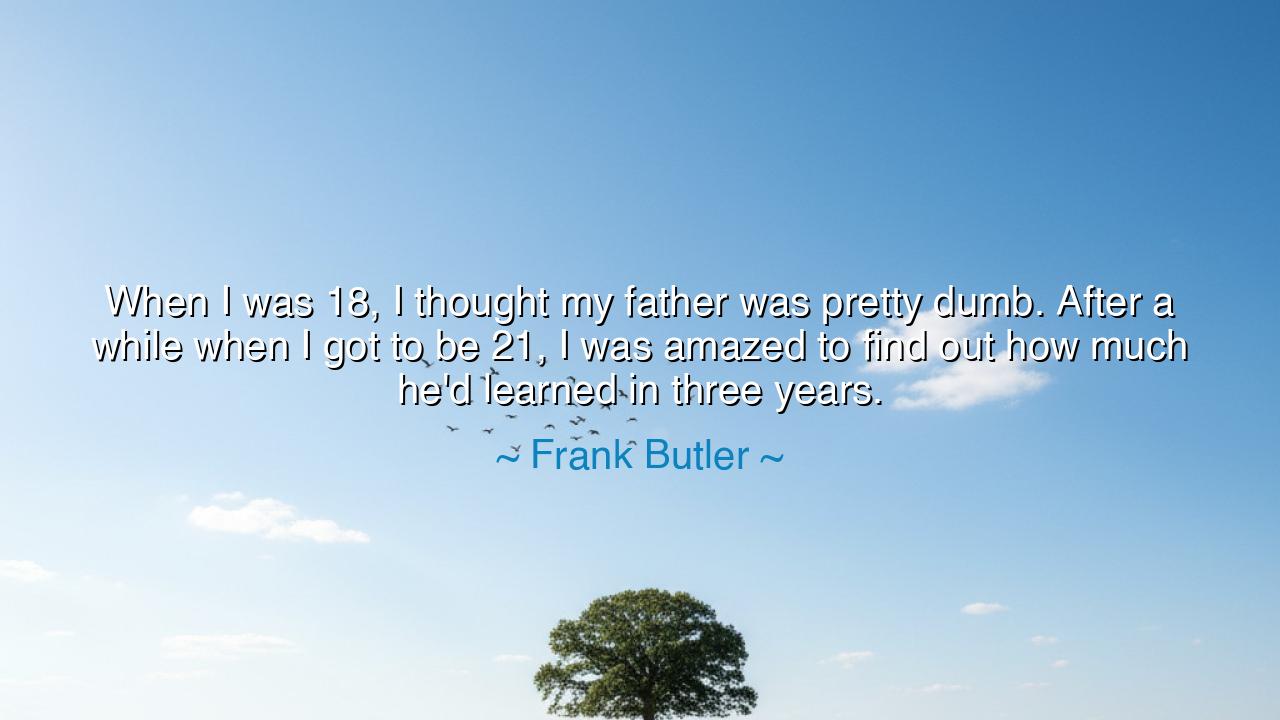
When I was 18, I thought my father was pretty dumb. After a while
When I was 18, I thought my father was pretty dumb. After a while when I got to be 21, I was amazed to find out how much he'd learned in three years.





“When I was 18, I thought my father was pretty dumb. After a while when I got to be 21, I was amazed to find out how much he'd learned in three years.” Thus spoke Frank Butler, not as a philosopher in a temple, but as a man of wit who grasped one of life’s quietest truths — that wisdom often grows not in the world, but in the eyes of those who begin to see it. The quote, clothed in humor, hides a revelation: that it is not the father who changes, but the child who awakens. It is a parable of youth and age, of arrogance turned to understanding, of pride giving way to reverence.
When we are young, the world seems small enough to fit within our hands. We believe that knowledge is our own, that experience is an unnecessary burden, and that the guidance of our elders is but the echo of a bygone age. At eighteen, the heart burns with certainty; it mistakes confidence for wisdom and independence for truth. But time, that gentle teacher, humbles the proud and softens the scornful. By twenty-one, or thirty, or fifty, we look back and realize that those we once judged ignorant were simply patient, waiting for us to grow enough to understand their silence.
The humor of Butler’s words lies in their irony — the idea that a father could have “learned” so much in three years is impossible, yet that impossibility hides the truth: the child was the one who changed. Maturity is not the accumulation of facts, but the dawning of perspective. What once seemed foolish now seems wise; what once seemed controlling now appears protective. The once “dumb” father becomes, in time, the silent hero of our youth — the one who bore our arrogance with grace, who guided us even as we turned away.
In the ancient world, this truth was known and revered. The philosopher Socrates, who was said to be the wisest of men, declared that true wisdom begins with the admission of ignorance. So too does the young man’s journey toward understanding begin when he confesses that his father was not the fool he imagined. The Greeks honored their elders not because they were perfect, but because they had walked farther along the road of life. To despise their wisdom was to deny the map that could guide one safely through the wilderness of existence.
Consider the story of Prince Siddhartha, who would become the Buddha. As a youth, he rebelled against his father’s protection, seeking truth beyond the palace walls. He believed his father’s wisdom narrow, his rules confining. Yet when he returned — aged by his search and enlightened by suffering — he understood that his father’s shelter had not been ignorance, but love. The father had tried to spare him the pain that every soul must face alone. In this way, the story of the Buddha echoes Butler’s wit: the father did not change — the understanding of the son did.
As the years pass, we come to see that experience is the teacher our fathers once embodied. We hear in our own voices the words we once mocked, we repeat their cautions to our children, and we marvel at how “wise” they suddenly seem. This is the eternal rhythm of generations — each youth believing itself wiser than the last, until life’s trials carve humility into the heart. Then, at last, the eyes clear, and we see that wisdom was standing beside us all along, disguised in ordinary words and patient smiles.
Therefore, my children, when you find yourself dismissing the counsel of those who came before you, pause and listen again. Ask not, “What do they know?” but rather, “What have they endured?” For knowledge is learned from books, but wisdom is purchased with pain. Respect the years, for they are the footprints of understanding. And know that those who seem outdated may, in truth, have already walked the path you now struggle to see.
The lesson is simple, yet profound: humility is the beginning of wisdom. To honor your parents is not blind obedience, but the recognition that love often speaks in ways youth cannot yet comprehend. So be patient with those who guide you, and be grateful to those who bore your ignorance with grace. For one day, you too will stand where they once stood, and the laughter of your youth will become the quiet smile of remembrance — when you finally realize how much your father had “learned” in those few, fleeting years.






AAdministratorAdministrator
Welcome, honored guests. Please leave a comment, we will respond soon